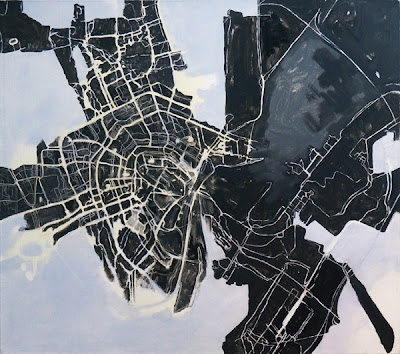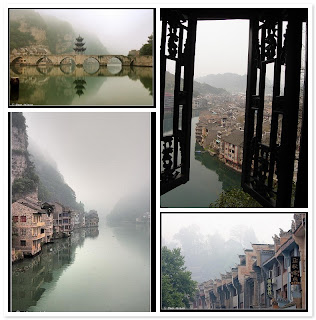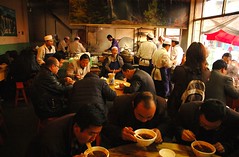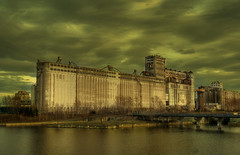KATHMANDU
THERE ARE MANY THINGS ONE "SHOULD SEE" in this valley, but I secrecy resent being bossed by guidebook and am therefore a slipshod tourist. To me the little statue that one unexpectedly discovers down an alley way and impulsively responds to, means much more than the temple one had been instructed to admire for erudite and probably incomprehensible reasons.
-Dervla Murphy, The Waiting Land
KATHMANDU
THE ENERGY OF THE PLACE SLAMS LIKE A SHOCK wave... Kathmandu is so overwhelming, so packed with images, that succinct summaries seem almost impossible- certainly inadequate. I'm tempted to say "You'll understand when you get there...." It's a dream. I've never seen anything 1ike it.
-David Yeadon, The Back of Beyond
Osaka's Shinsekai
" Welcome to Osaka. Few major cities of the developed world could match Osaka for the overall unattractiveness of its city- scape, which consists mostly of a jumble of cube-like buildings and a web of expressways and cement-walled canals. There are few skyscrapers, even fewer museums and, other than Osaka Castle, almost no historical sites. Yet Osaka is my favorite city in Japan. Osaka is where the fun is: it has the best entertainment districts in Japan, the most lively youth neighborhood, the most charismatic geisha madams and the most colorful gangsters. It also has a monopoly on humor, to the extent that in order to succeed as a popular comedian it is almost obligatory to study in Osaka and speak the Osaka dialect. Osaka people are impatient and love to disobey rules; in that spirit, the best way to approach the city is to dispense with preliminaries and go straight to the heart of the mandala, which in Osaka's case is Tsutenkaku (the Tower Reaching to Heaven). Tsutenkaku is another of the towers which, like Tokyo Tower and Kyoto Tower, were built in every major city after World War II. Wartime bombing had almost completely obliterated Osaka's old downtown area, so the city redrew the streets in a huge burnt-out district, and built Tsutenkaku in the middle of it. The tower stands in the center of a rectangle covering about twenty square blocks called Shinsekai (New World), which is filled with restaurants, shops and theaters. Roads radiate from the arches under the tower like the avenues emanating from the Arc de Triomphe in Paris. However, all resemblance to Paris, or even the amusement districts of other Japanese cities, ends here. Once the mecca of laborers, such as the farmers of Iya who flooded the cities in the decades after the war, Shinsekai has become a slum. In clean, organized and law-abiding modem Japan, this is an exceptional phenomenon. Most people visiting Shinsekai enter via Janjan Yokocho, an arcade stretching from Imamiya Station into the district's inte- rior. The minute you get out of the train station, you realize that you are in another country: drunks and homeless people stagger by, and young men are more likely to be wearing wide coolie pants and boots than the latest fashions from Tokyo's trendy Harajuku area. You pass a street market where you can buy second-hand underwear or a single shoe. Janjan Yokocho is dark and dingy - you see the occasional rat scurrying across from one building to another - but it is crowded with people. They are . coming to eat at the kushikatsu restaurants lining the street, which feature cheap meals of pork, chicken, onions and eggs, deep-fried on wooden skewers and washed down with plenty of beer and shochu (vodka made from rice). Interspersed among the kushikatsu restaurants are shogi halls, where people sit in pairs playing Japanese chess, watched through open latticed windows by knots of people gathered on the street outside.
ALEX KERR, Lost Japan
ALEX KERR, Lost Japan
[ :: ]
19.7.08
[Tags]
Osaka 大阪 [Japan]
Empire of Signs
This city (Kyoto) can only be known only by an activity of an ethnographic kind: you must orient yourself in it not by book, by address, but by walking, by sight, by habit, by experience; here every discovery is intense and fragile, it can be repeated or recovered only by memory of the trace it has left in you: to visit a place for the first time is thereby to begin to write it: the address not being written, it must establish its own writing.
ROLAND BARTHES , Empire of Signs
ROLAND BARTHES , Empire of Signs
[ :: ]
25.6.08
[Tags]
Kyoto 京都 (Japan)
Japan Voyage
I wonder what other joys await me in Kyoto, the widow royal city, where I will arrive tonight. Traveling is captivating hunting; you go out never guessing what bird will come along. Traveling is like wine: you drink and you can't imagine what visions will come to your mind. Surely while traveling you find all that you have within you. Without wanting to, from the innumerable impressions that overflow your eyes, you choose and select whatever corresponds more to the needs or curiosities of your soul. "Objective" truth exists only-and how insignificant it is!- in the photographic cameras and in the souls that see the world coldly, without emotion, that is, without deep contact. Those who suffer and love communicate through a mystical intercourse with the landscape they see, the people they mingle with, and the incidents they select. Therefore, every perfect traveler always creates the country where he travels.
NIKOS KAZANTZAKIS, Japan, China: A Journey of Two Voyages to the Far East
NIKOS KAZANTZAKIS, Japan, China: A Journey of Two Voyages to the Far East
[ :: ]
25.6.08
[Tags]
Kyoto 京都 (Japan)
Cities comparison
TOP CITIES - Quality of life.
1 Zurich
2 Vienna
2 Geneva
4 Vancouver
5 Auckland
6 Dusseldorf
7 Munich
7 Frankfurt
9 Bern
10 SydneyMercer's 2008 Worldwide Quality of Living Index
[ :: ]
12.6.08
Italian Hours
'It is a fact that almost everyone interesting, appealing, melancholy, memorable, odd, seems at one time or another, after many days and much life, to have gravitated to Venice by a happy instinct, settling in it and treating it, cherishing it, as a sort of repository of consolations; all of which today, for the conscious mind, is mixed with its air and constitutes its unwritten history. The deposed, the defeated, the disenchanted, the wounded, or even only the bored, have seemed to find there something that no other place could give.' Henry James, Italian Hours, 1909
[ :: ]
10.6.08
[Tags]
Venice : Venezia: [Italy]
Marble Lions
I glided off, in one of the dark boats, until we came to an old Arsenal guarded by four marble lions. To make my Dream more monstrous and unlikely, one of these had words and sentences upon its body, inscribed there, at an unknown time, and in an unknown language; so that their purport was a mystery to all men. " Charles Dickens, An Italian Dream, 1844
[ :: ]
22.5.08
[Tags]
Venice : Venezia: [Italy]
Italian Journey - Roma
"In the solitude of the Via Sacra the well-known objects seemed alien and ghost-like. But when I approached the grand ruins of the Colosseum and looked through the gate into the interior, I must frankly confess that a shudder ran through me, and I quickly home.
Any gigantic mass has a peculiar effect on me; it has something about it which is at once fascinating and awe-inspiring. I drew up a summa summarum of my whole stay in Italy, and this roused in my agitated soul a mood I might call heroic-elegiac, for it tried to embody itself in the poetic form of an elegy." Goethe, Italian Journey
Any gigantic mass has a peculiar effect on me; it has something about it which is at once fascinating and awe-inspiring. I drew up a summa summarum of my whole stay in Italy, and this roused in my agitated soul a mood I might call heroic-elegiac, for it tried to embody itself in the poetic form of an elegy." Goethe, Italian Journey
[ :: ]
18.5.08
[Tags]
Rome : Roma : [Italy]
Used to be...
The magic of Sydney is fading for Sydney Magazine's editor who thrives on the creative buzz of New York. "I've noticed Sydney's changing a lot. There's a new aggression and road rage. Sydney used to be all about good sportmanship and politeness. In the last couple of years, there's been a negative energy: a sense of money, greed, and no fair game like there used to be. I say this with certain amount of sadness, as someone who really loves Sydney." Brana Wolf, Sydney Magazine (SMH), May 2008
[ :: ]
1.5.08
[Tags]
Sydney [Australia]
Sydney - the other side
"Sydney, it's a bit like Melbourne. More money, less society, more beauty, less substance. Better weather, minus the golf ball hail storms. Illogical urban planning, with buses polluting. Restaurants with views, and long queues. Bigger nightlife, with little soul. Slaves to fashion with little sense of personal style. Leggy blondes that show lots of skin and not much within. More stockbrokers, publicists and unwarranted pretension, with not a hint of discernment or culture." Jessica Smith, Sydney Magazine (SMH), April 2008
[ :: ]
30.4.08
[Tags]
Sydney [Australia]
Quote of the Day
"A Slow Day:
Echoes heard
In a corner of Kyoto"
Yosa Buson
Echoes heard
In a corner of Kyoto"
Yosa Buson
[ :: ]
23.4.08
[Tags]
Kyoto 京都 (Japan)
City of Haunting Dreams
"Venice appears to us as if in a dreams, its breathtaking architecture and overwhelming weight of history challenging the soulless uniformity of our modern-day world. This unique city of so many contradictions, of shifting light and dark shadows, subtle movement and fleeting glances, quickly seduces us with its timeless beauty. It is only later that we become aware of its other, more sinister side." Simon Marsden, Venice City of Haunting Dreams 2001
[ :: ]
23.4.08
[Tags]
Venice : Venezia: [Italy]
[Mantova] City*set
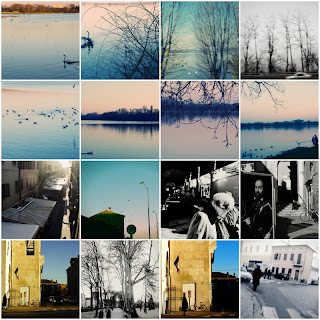 Photos by Motocchio
Photos by Motocchio1. swan lake, 2. wings, 3. FADED MEMORY: swan lake in late autumn, 4. FADED MEMORY: drive in a foggy day, 5. PRELUDE: birds, 6. calm swim, 7. the end of the day, the beginning of spring, 8. *, 9. morning at the market day, 10. *, 11. her morning, 12. perspective, 13. winter morning diptych, 14. 冬の散歩/passeggiata invernale, 15. mantova, february 2008, 16. FADED MEMORY: on the way
[ :: ]
28.2.08
[Tags]
Mantova [Italy]
Still there...
"I heard the familiar sounds of the street below: the high-pitched call of the bread seller, the newsboys reciting the day's headlines through an amplifier on his bicycle, the growl of jackhammers, the tap, tap, tao of the bronze caster's hammer on an emerging statue of Buddha. It was a reassuring medley, a reminder that even as great changes were sweeping through South East Asia's oldest capital, the intimacy and timelessness of Hanoi lingered, undaunted by the suffering of war or the burdens of peace." David Lamb, National Geographic 2004
[ :: ]
4.2.08
[Tags]
Hanoi : Hà Nội : (Vietnam)
[Hanoi] Poem
Ten years, time turned into a durable thread
Flowers bloom in violets, the wall covered with mold and moss.
Ten years in Hanoi and I have found
My own sort of joys and sorrows.
Poet Nguyen Duc Mau
Flowers bloom in violets, the wall covered with mold and moss.
Ten years in Hanoi and I have found
My own sort of joys and sorrows.
Poet Nguyen Duc Mau
[ :: ]
31.1.08
[Tags]
Hanoi : Hà Nội : (Vietnam)
Quote of the Day
"Kyoto's beauty is elusive and has to be sought out with patience and forethought......the best of what Kyoto has to offer is often small in scale and of a delicacy that the encroachment of raucous modernity seems always to underline, and sometimes enhance." Alan Booth, 1991
[ :: ]
30.1.08
[Tags]
Kyoto 京都 (Japan)
A Little Lost
"I thought I knew Venice but suddenly you're in the middle of that kaleidoscope of people and places and little pieces and little bridges and little canals and you don't know where the hell you are." Alan Whicker. Sunday Life March 12, 2006
[ :: ]
24.1.08
[Tags]
Venice : Venezia: [Italy]
Subscribe to:
Posts (Atom)



